- Activists who are working to level lawsuits on oil companies and the federal government are reeling after a series of brutal defeats, with one environmentalist saying a child-led climate lawsuit was a “big ask.”
- Judges have nixed climate lawsuits leveled at the Trump administration and ExxonMobil, respectively, leaving similar litigation in Baltimore in limbo.
- The judges in the children’s climate lawsuit argue that it is “beyond our constitutional power” to force President Donald Trump to tackle global warming.
Activist-led attempts to hold the government and oil companies responsible for climate change through the court system are hitting a brick wall as judges argue such efforts are unlikely to gain traction.
A panel of judges knocked down a lawsuit on Jan. 17 in which a large group of young people sued the Trump administration for not doing more to tackle global warming. One of the judges in that case strenuously dissented, suggesting that the court might curse the day it nixed the argument.
Children do not have standing to sue the federal government for not adequately addressing climate change, the 9th Circuit Court of Appeals in California ruled in the case. The 21 young people argued the government had a constitutional responsibility to cut support for fossil fuels.
President Donald Trump has made headway in recent months changing the makeup of the 9th Circuit Court. He nominated Patrick Bumatay and Lawrence VanDyke to the court in September 2019. They would raise the number of Trump’s 9th Circuit appointees to nine.
The panel did not buy the argument. “Reluctantly, we conclude that such relief is beyond our constitutional power. Rather, the plaintiffs’ impressive case for redress must be presented to the political branches of government,” the panel wrote in their decision.
Judge Andrew Hurwitz ruled that it was “beyond the power” of his court to mandate the federal government to set climate policy, writing that the case “must be made to the political branches or to the electorate at large.”
The panel argued the government had competing interests, including “economic or defense considerations.” One judge dissented, arguing that the climate case was a matter of “social justice” and that delaying the matter further could have a negative impact on the plaintiff’s lives.

U.S. President Donald Trump refers to amounts of temperature change as he announces his decision that the United States will withdraw from the landmark Paris Climate Agreement in the Rose Garden of the White House in Washington, U.S., June 1, 2017. REUTERS/Joshua Roberts
“The denial of an individual, constitutional right — though grievous and harmful — can be corrected in the future, even if it takes 91 years. And that possibility provides hope for future generations. Where is the hope in today’s decision?” Judge Josephine Staton wrote in her dissent.
She added: “Plaintiffs’ claims are based on science, specifically, an impending point of no return.” (RELATED: 9th Circuit Court Of Appeals Deals Brutal Blow To Teens Who Sued Trump Over Climate Change)
Michael Burger, executive director of Columbia Law School’s Sabin Center for Climate Change Law, said in a statement to The Washington Post: “From the outset, it was a big ask.”
This is the second climate lawsuit judges have nixed in a matter of months. New York Attorney General Letitia James, a Democrat, argued in a 2018 lawsuit that ExxonMobil deceived customers, exposing “the company to greater risk from climate change regulation than investors were led to believe.”
New York’s Supreme Court cleared the company in November 2019, effectively ending New York’s nearly four-year-long crusade against the company, which began in 2015 with an investigation and ended with a lawsuit lodged in New York.
Former New York Attorney General Eric Schneiderman initially led the effort before resigning under disgrace.
Judge Barry Ostrager appeared to treat James’s concerns seriously before eventually dismissing the case outright. “Nothing in this opinion is intended to absolve ExxonMobil from responsibility for contributing to climate change,” he wrote in his opinion.
Ostrager found James’s case fell short in demonstrating that the oil company violated an anti-fraud law.
“The Court finds that the Office of Attorney General failed to prove by a preponderance of the evidence that ExxonMobil made any material misrepresentations that ‘would have been viewed by a reasonable investor as having significantly altered the “total mix” of information made available,'” Ostrager wrote in a memo.
Activist-led lawsuits are still in the offing. The U.S. Supreme Court, for instance, rejected in October 2019 a request from several energy companies to block a Baltimore lawsuit seeking to hold Exxon and other oil producers responsible for producing carbon emissions.
Editor’s Note: Burger’s quote has been updated to better reflect its context.
All content created by the Daily Caller News Foundation, an independent and nonpartisan newswire service, is available without charge to any legitimate news publisher that can provide a large audience. All republished articles must include our logo, our reporter’s byline and their DCNF affiliation. For any questions about our guidelines or partnering with us, please contact licensing@dailycallernewsfoundation.org.


